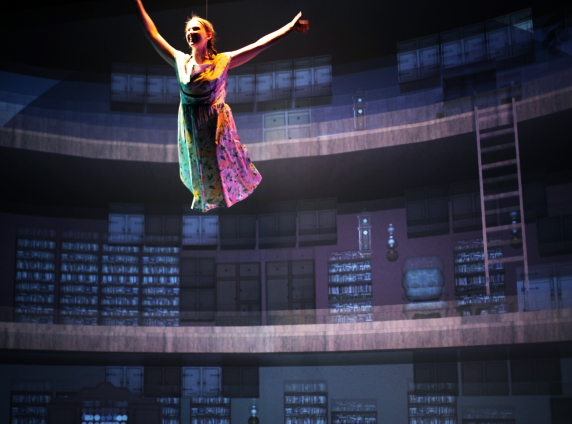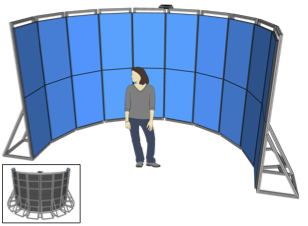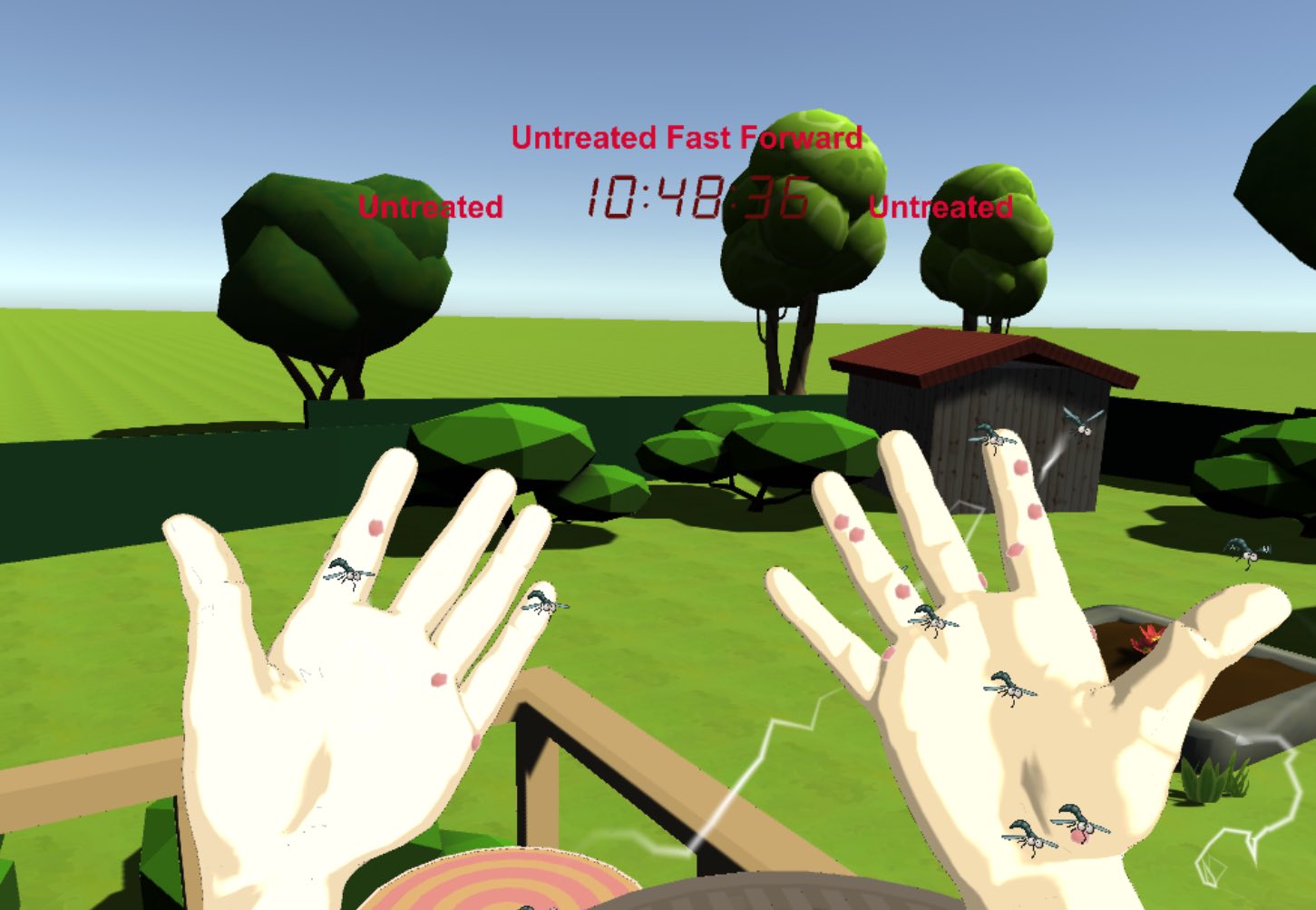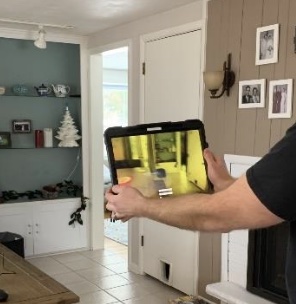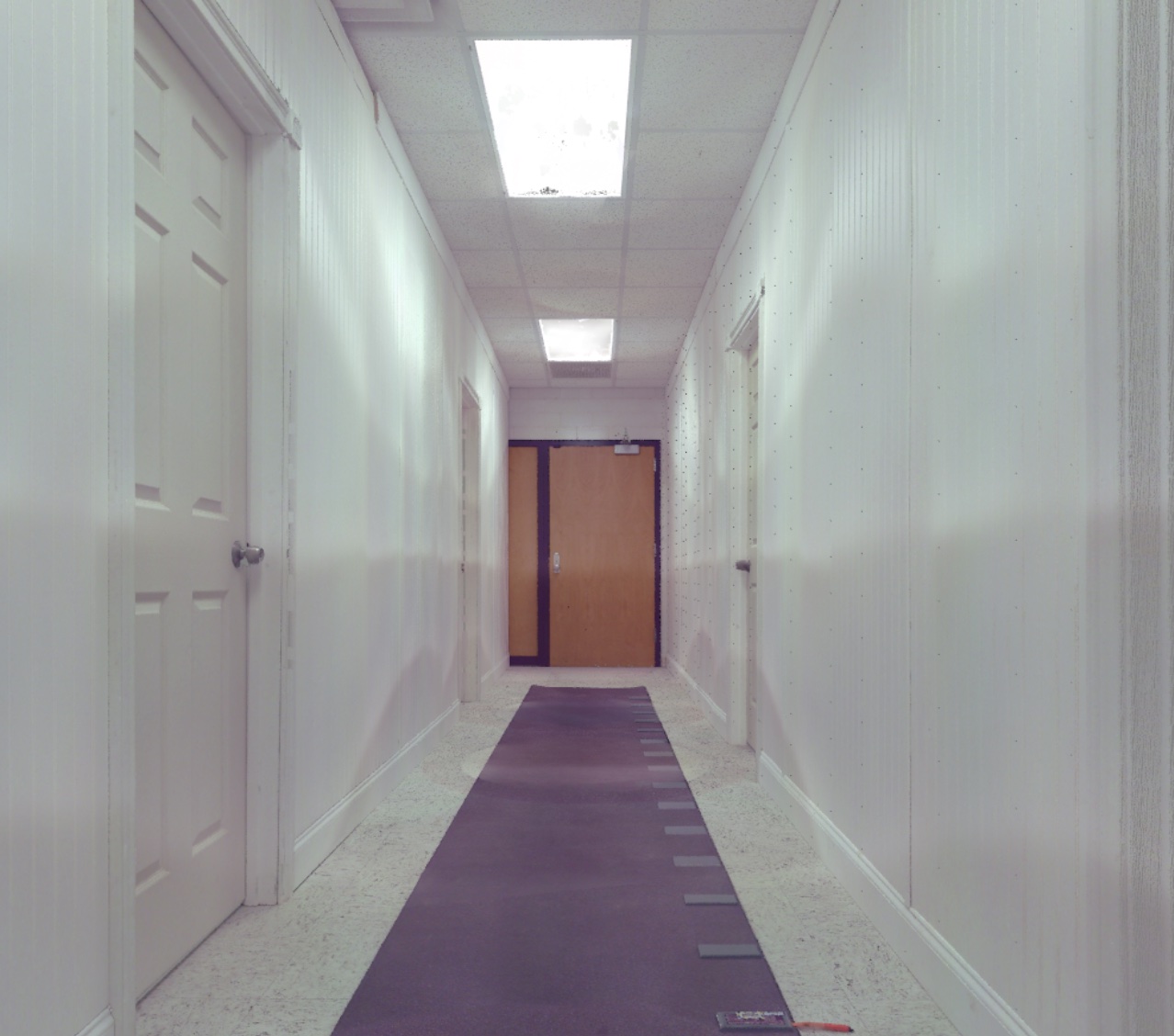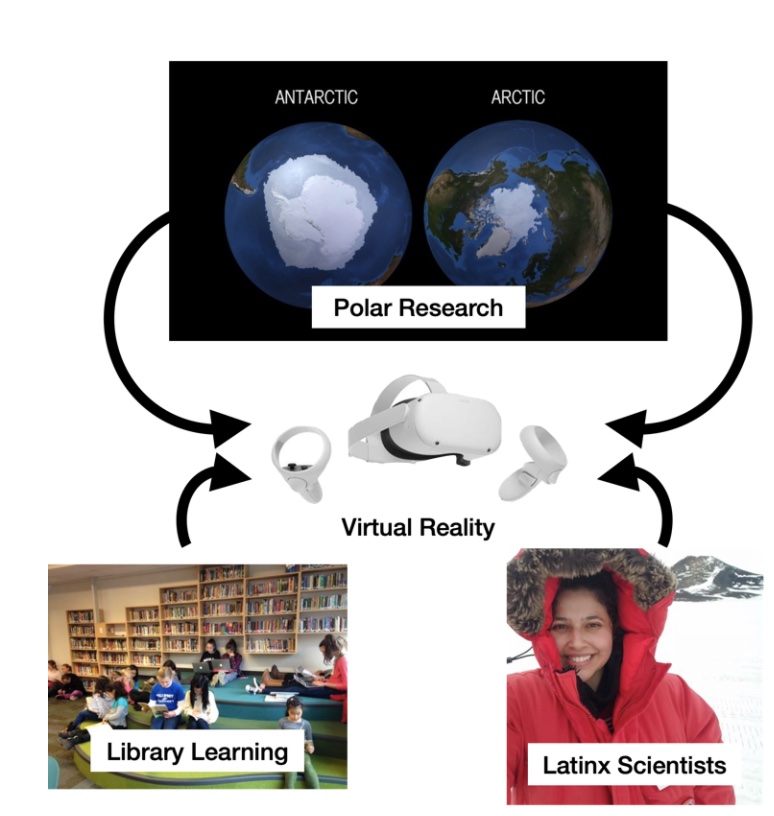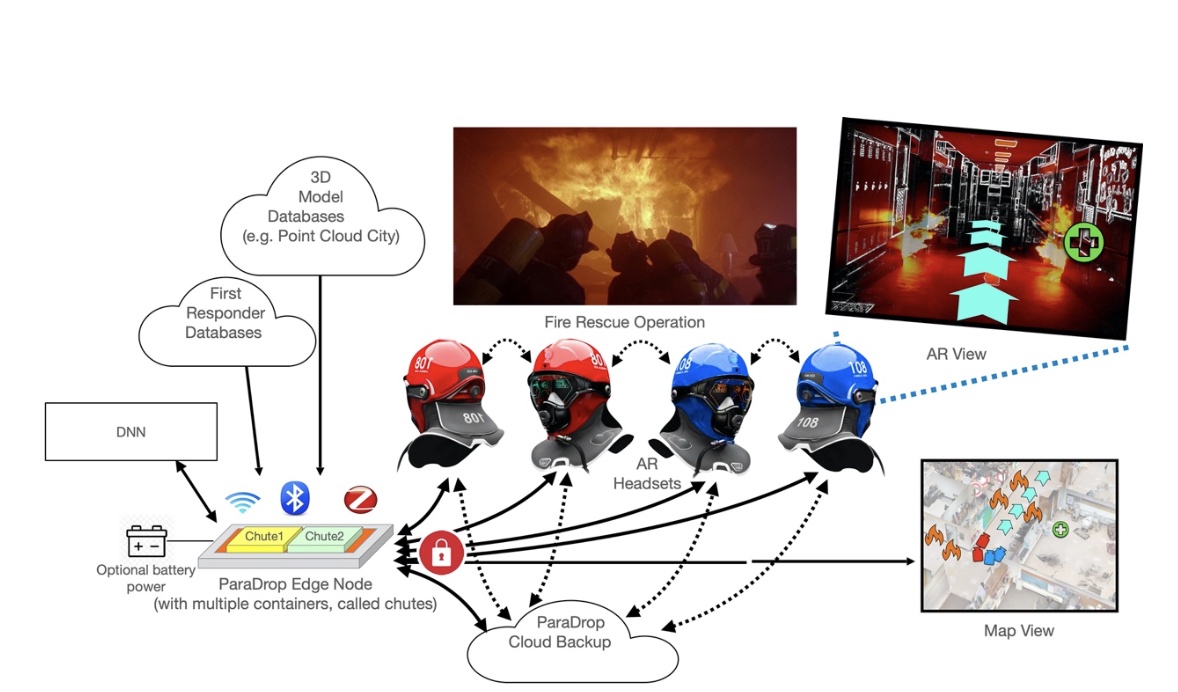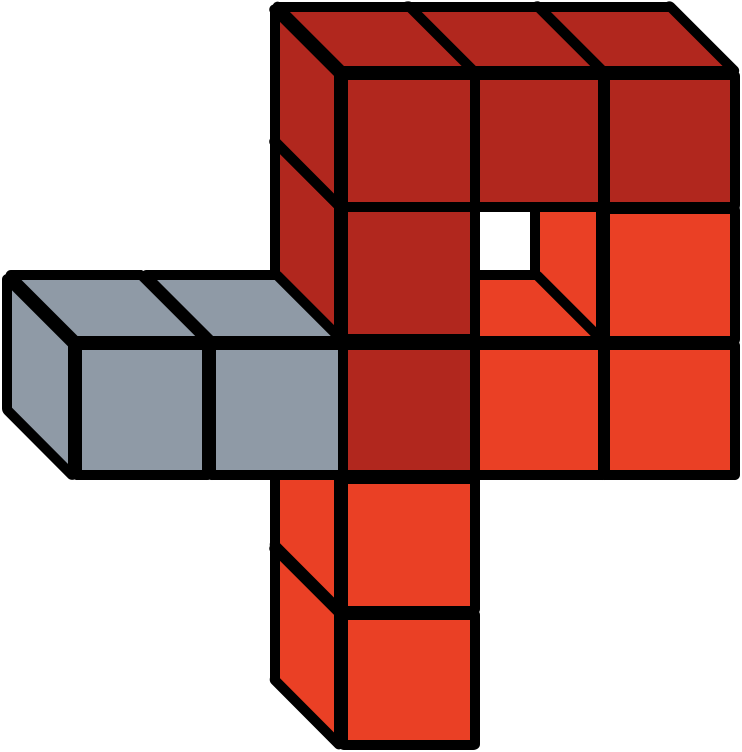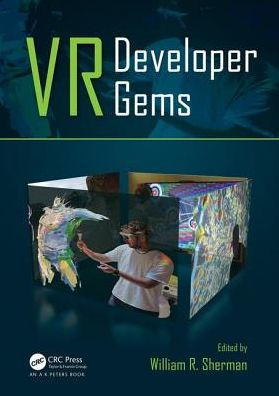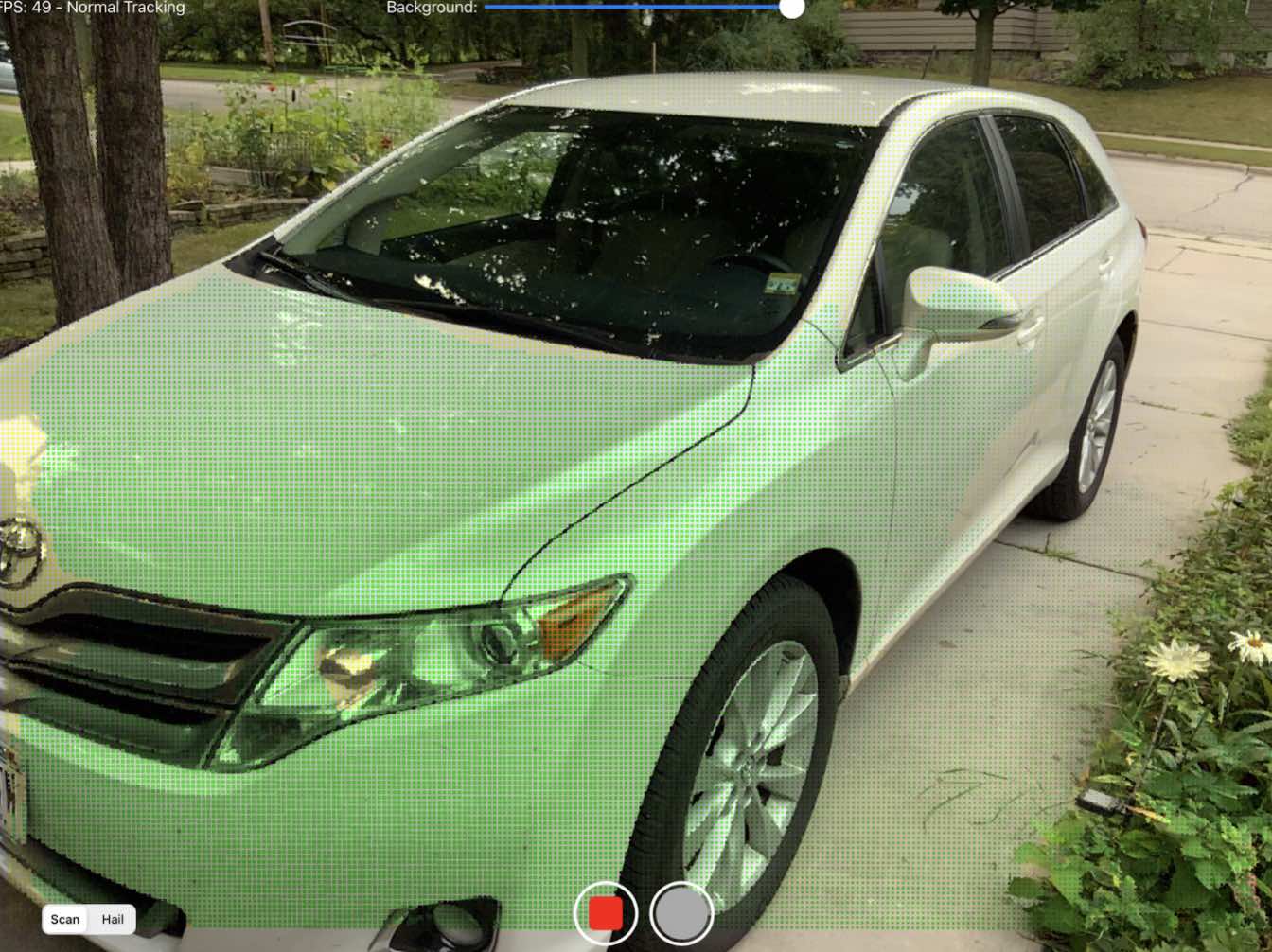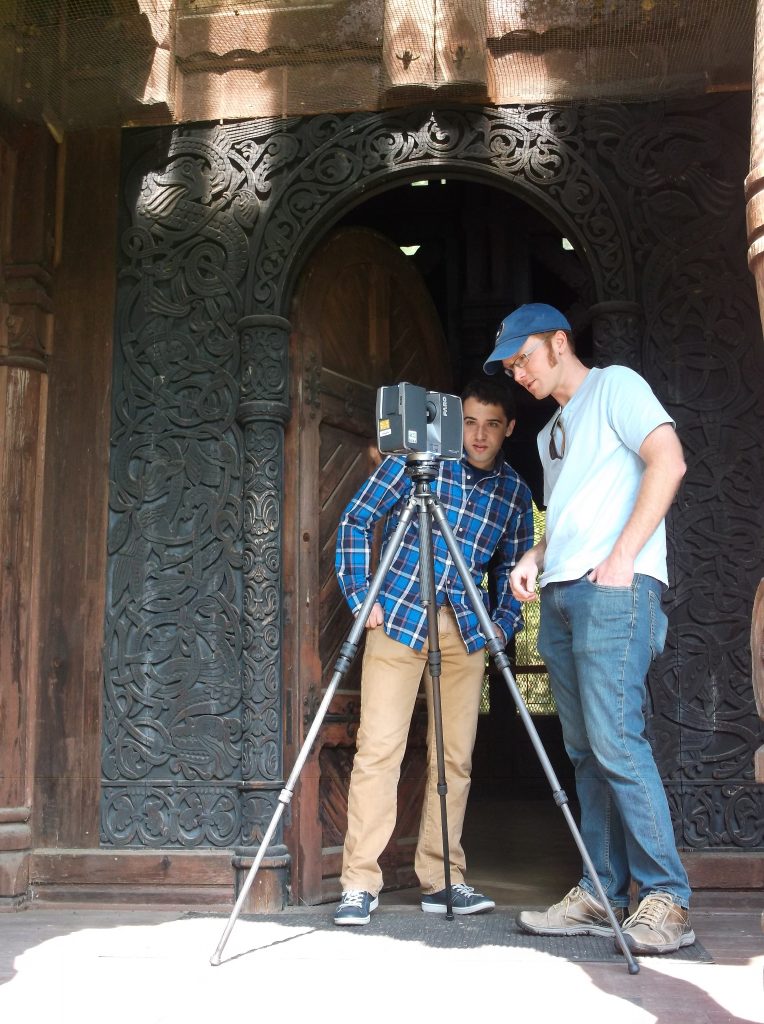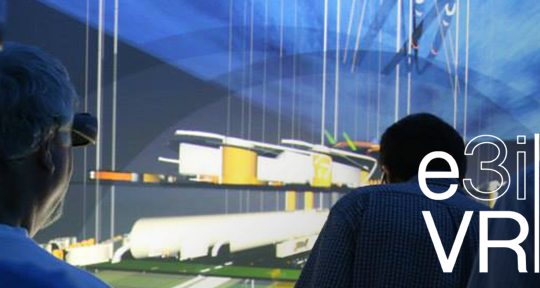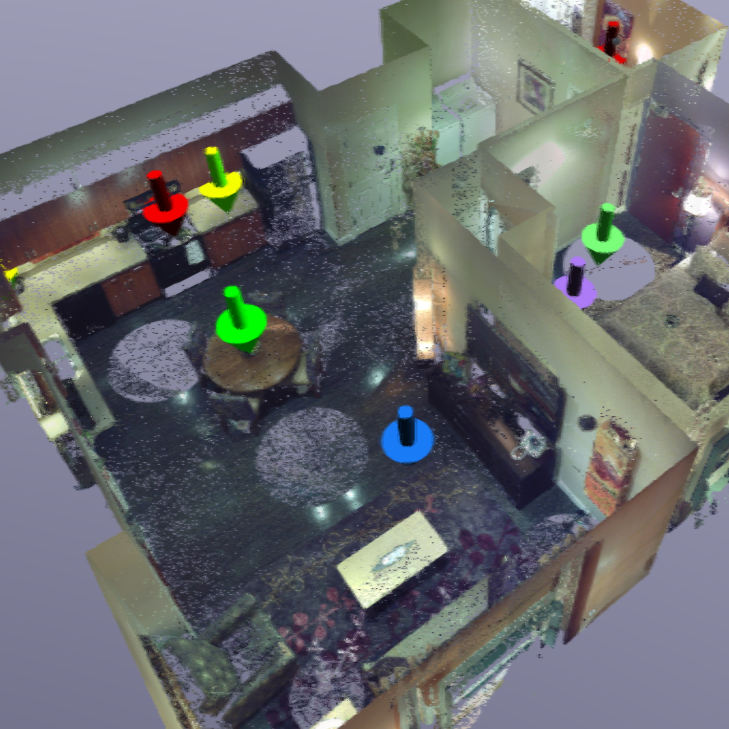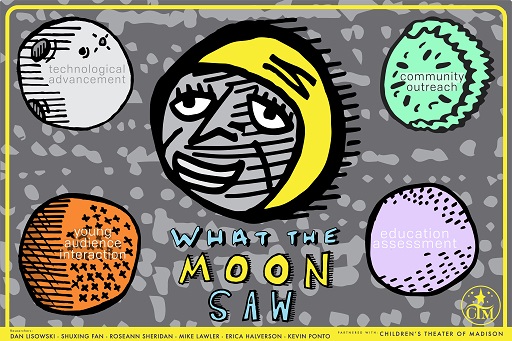My research revolves around the utilization of virtual reality to simulate the experience of real-life spaces for real-world outcomes. My long-term goal is to better understand the human experience of immersive visualization to enable a more effective means of designing virtual reality systems and communicating virtual reality content. This work has spanned a variety of disciplines. See a listing below of my current and previous research projects.
Current Funded Projects
Capture and Display
Timber Sale Administration Virtual Reality Training
This project aims to create a virtualized training for timber sale Administration. The team will capture real world forests and recreate them in virtual reality training scenario.
Funding:
Timber Sale Administration Virtual Reality Training,
USDA, Forest Service,
Principal Investigator: K. Ponto,
Total Costs $230,573 (Start Date: 09-01-2022 End Date: 08-31-2024).
Role:
PI
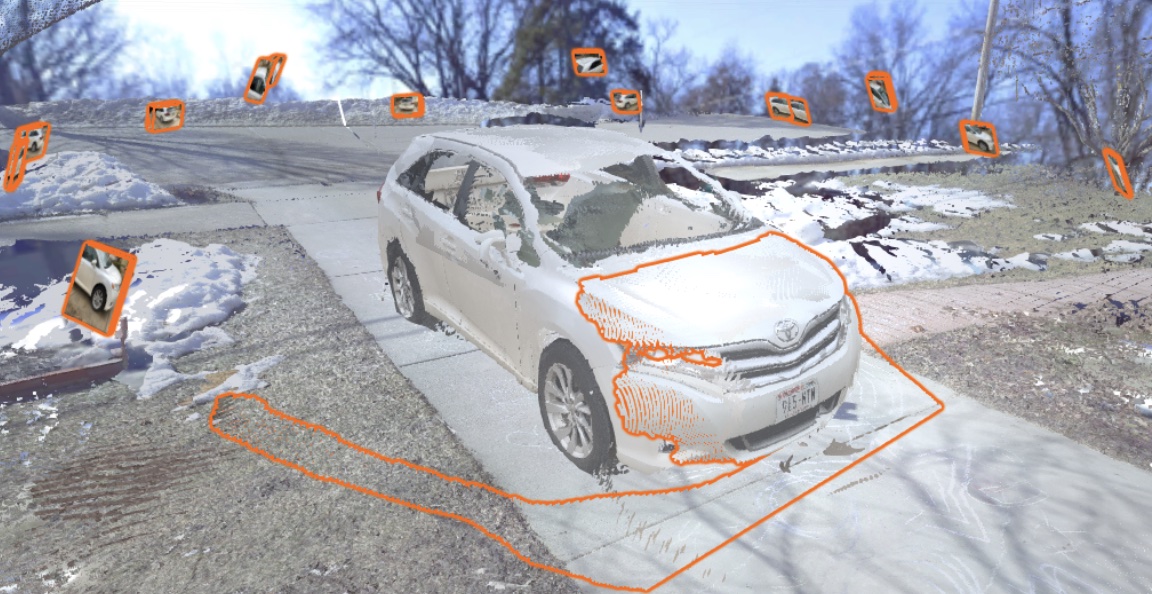
Documentation and assessment of personal property in situations of accidents or disasters is a major component of the claims process that takes place between an insurance company and their customers. One method to try to increase efficiency in this process is to enable customers to document events through photographs on digital platforms. The challenge in this approach is in assisting customers to provide the needed views and perspectives to capture the pertinent information. Recent advances in depth sensors have created new possibilities for the capture of real world objects in 3D. In this project we will develop methods to combine tracking data from AR tracking algorithms with the color and depth sensor information to create mixed reality models. The developed application will provide an interactive visualization to help guide users through the capture process, guiding them as to what has and what has not yet been captured. The result of this scanning process will be a 3D model along with standard 2D photographic information in means of providing new methods for insurance related documentation.
Funding:
Developing Novel Mixed Reality Tools for Consumer Insurance Documentation., American Family Insurance Data Science Institute,
Principal Investigator: K. Ponto,
Total Costs $109,642 (Start Date: 10-01-2021 End Date: 09-30-2022).
Role:
PI
Health
The proposed study will develop a standardized digital home assessment tool using a novel augmented reality technology to enable home assessments to be performed more effectively and efficiently. Our process will combine 3D scanning and Augmented
Reality (AR) technologies, data visualization, and the housing assessment tool. To this end, we will first create a highly portable and cost-effective 3D scanning and AR tool using currently available consumer grade technology and interactive digital environments allowing assessors toevaluate homes off-site. An expert panel composed of older adults, caregivers, and qualified aging in place professionals will participate in the usability, content validity,and acceptabilitytests. The research team will develop a set of training materials and tutorials for distribution ona national scale in the subsequent stage.
Funding:
Developing a Novel Augmented Reality Tool for Home Assessments., RRF Foundation for Aging,
Principal Investigator: J. Shin,
Total Costs $249,000 (Start Date: 7-01-2021 End Date: 08-31-2024).
Developing a novel augmented reality tool for home assessments., University of Wisconsin - Madison Fall Competition,
Principal Investigator: K. Ponto,
Total Costs $24,000 (Start Date: 07-01-2021 End Date: 06-31-2022).
Role:
Co-PI/PI
Simulating Activities of Daily Living
Our long-term goal is to redefine the way we study and assess social behaviors and abilities. We propose a narrative-based Virtual Reality (VR) system that interacts with the participant to elucidate the heterogeneity of social constructs within and across diagnoses. With our narrative-based VR system, we can assess multiple constructs of social development, including social engagement, emotion recognition, shared affect, Theory of Mind (ToM), imitation, narrative subjectivity, and imaginative storytelling. Our objective for this VR system is to bundle measures of social constructs (a concept aligned with the RDoc) to evaluate individual differences among children, comparing our VR system against existing metrics of cognitive ability and social functioning.
Funding:
Simulating Activities of Daily Living for the Assessment of Fall Risk in Older Adults, CHS 1815506 National Science Foundation,
Principal Investigator: A. Mason,
Total Costs $499,999 (Start Date: 9-01-2018 End Date: 08-31-2021).
Role:
Co-PI
Utilizing the Library System and Virtual Reality Learning Experiences To Engage Rural and LatinX Communities in Polar Research
This project will create a series of five narrative VR experiences of different polar research topics, allowing a user to work towards becoming a “polar explorer”. Each VR experience will enhance knowledge and raise awareness of a particular research area and explain its importance. The five experiences will focus on a central theme of polar research in means of broadening the perceptions of science. VR is particularly powerful and an apt approach since the public cannot experience first-hand, the significant research taking place in polar regions. There is a critical need to develop virtual polar research experiences, and advance informal science education knowledge by collecting data to understand how and in what ways the messages of these experiences are being consumed by their users.
Funding:
Utilizing the Library System and Virtual Reality Learning Experiences To Engage Rural and LatinX Communities in Polar Research,
OPP 2116046 National Science Foundation,
Principal Investigator: K. Ponto,
Total Costs $2,775,986 (Start Date: 07-15-2021 End Date: 06-30-2026).
Role:
PI
Becoming Joey
The project will allow users to virtually experience the science behind Adelie Penguins in an engaging way through embodying the user as an Adelie Penguin to partake in a narrative-based VR application that shares the story of the lives of these unique animals. VR technology enables users to experience environments that are difficult or impossible to physically inhabit, such as the Earth’s polar regions. As recent advances in VR technology have enabled greater accessibility to equipment, new directions in informal teaching and learning have emerged. As VR technology costs have reduced, the challenges for informal learning centers utilizing VR equipment have shifted from procuring the hardware to the development of engaging content.
Funding:
Becoming Joey: Promoting Informal Learning through Embodiment in an Adelie Penguin Virtual Reality Experience.,
OPP 2028478 National Science Foundation,
Principal Investigator: K. Ponto,
Total Costs $300,000 (Start Date: 01-01-2021 End Date: 12-31-2022).
Role:
PI
Systems and Applications
EasyVizAR: Edge-supported, Accessible, and Secure, Augmented Reality for Improved Visualization in Indoor First Responder Scenarios.
First responders work in highly challenging environments. They need to make split second decisions that may make the difference between life and death under stressful conditions. Easy, user-friendly access to information of different types can be the differentiator in many conditions. This project focuses on new innovations in the use of Augmented Reality (AR) systems, culminating in a system called EasyVizAR1—that provides an end-to-end solution to address many challenges common in emergency situations, especially in indoor environments.
Funding:
EasyVizAR: Edge-supported, Accessible, and Secure, Augmented Reality for Improved Visualization in Indoor First Responder Scenarios.,
National Institute of Standards and Technology,
Principal Investigator: S. Banerjee,
Total Costs $1,798,769 (Start Date: 07-01-2021 End Date: 06-31-2023).
Role:
Co-PI
Ongoing Projects
PointSpace
Role: PI
This project aims to take our research in simulating physical environments out into the real world.
Funding:
Point Cloud Data in Virtual and Augmented Reality,
WARF Accelerator Program,
Principal Investigator: K. Ponto,
Total Costs $83,201 (Start Date: 10-01-2018 End Date: 12-31-2020).
Role:
PI
Link: https://widve.github.io/pointspace/
UniCAVE
The UniCAVE project aims to build a plugin for Unity3D that provides support for CAVE environments utilizing features built into the engine. This approach enables a user to configure their system entirely in the Unity3D editor providing a simplified method for supporting adapting existing Unity projects for distributed visualization platforms.
Funding:
vizHOME: A context-based health information needs assessment strategy, RO1 PA11199 Agency for Healthcare Research and Quality,
Principal Investigator: P. Brennan / K. Ponto,
Total Costs $2,499,343 (Start Date: 09-30-2013 End Date: 09-29-2018).
Role:
PI
Link:
https://widve.github.io/UniCAVE/
Completed Projects
Capture and Display
Analyzing the Impact of Virtual Reality and 3D Capture Technology on Crime Scene Investigation
This project uses 3D scanning technology to capture crime scenes that can later be visualized, allowing the scenes to be virtually revisited at any point in time in explicit detail. This project aims to determine the cost/benefits of using this approach over traditional techniques.
Funding:
Analyzing the Impact of Virtual Reality and 3D Capture Technology on Crime Scene Inves- tigation,
2016-IJ-CX-0017 Department of Justice,
Principal Investigator: K. Ponto,
Total Costs $265,103 (Start Date: 01-31-2017 End Date: 12-31-2018).
Role:
PI
Link:
https://3d-csi.discovery.wisc.edu/
Developing a Novel 3D Capture Based Automated Inventory System for Insurance Documentation
The overall goal of this project is to design and implement a system that utilizes 3D scanning and 3D capture technology that could be used for automated documentation of scenes. This has the potential to reduce disputes between insurance companies and their clients, thus resulting in savings of money and time for both parties. As the utilization of 3D capture technology in this area is quite novel, and upcoming technological changes may further create new directions of inquiry, the project aims to research and design an initial area of impact, an Automated Inventory System, to determine how progress in this research could lead to impactful projects through subsequent stages of research.
Funding:
Developing a Novel 3D Capture Based Automated Inventory System for Insurance Documentation.,
American Family Insurance Data Science Institute,
Principal Investigator: K. Ponto,
Total Costs $108,041 (Start Date: 08-01-2020 End Date: 07-31-2021).(Start Date: 9-01-2018 End Date: 08-31-2021).
Role:
PI
A Virtual Tour through Mount Horeb Area History
Health
vizHOME
More and more of health care occurs in the home, and a growing number of computer tools are becoming available to help people manage personal health concerns and health information. This project will figure out how features of the home interior, such as the adequacy and privacy of space available for health, and common household objects like calendars and file cabinets, help or hinder people as they manage health information.
Funding:
vizHOME: A context-based health information needs assessment strategy, RO1 PA11199 Agency for Healthcare Research and Quality,
Principal Investigator: P. Brennan / K. Ponto,
Total Costs $2,499,343 (Start Date: 09-30-2013 End Date: 09-29-2018).
Role:
PI
Link:
http://vizhome.org/
Age in Place
AgeInPlace is a project jointly funded by the Tommy G. Thompson Center on Public Leadership and the UW-Madison Graduate School. Our primary goal was to identify, document, and visualize everyday activities of older adults at home, common barriers that hinder their activities, and how home modification done to these homes influence health related behaviors. To this end, our research team employed a set of cutting edge technology including 3D scanning, tracking biomarkers, as well as multiple housing accessibility assessment tools completed by trained assessors.
Funding:
Living independently at home: Effect of home medications on functional independence, acute stress response, and adaptive behaviors of persons with disabilities.,
Tommy Thompson Foundation,
Principal Investigator: J. Shin,
Total Costs $130,181 (Start Date: 07-01-2018 End Date: 06-31-2020).
Role:
Co-PI
Link: https://ageinplace.wisc.edu/
e3iVR
The e3iVR conference is planned for April 2017 in the Discovery Building on the University of Wisconsin-Madison campus. The conference will feature a series of talks and breakout sessions, some of which will be open to the public, and will focus on the development of ethical standards in the emerging and growing field of Virtual Reality. The objective of this conference is to produce a set of guidelines for the ethical conduct of research experiments as well as clinical treatments including informed consent, integrity of the sense of person, meaningful explanation of side effects and consequences of a VR experience, and fair notification of the extensive data tracking now possible in these systems.
Funding:
e3iVR: Conference on ethics in investigational and interventional uses of immersive VR, R13 HS024833 Agency for Healthcare Research and Quality,
Principal Investigator: E. Gill,
Total Costs $32,079 (Start Date: 07-01-2016 End Date: 3-31-2017).
Role:
Co-I
Link:
https://conferences.discovery.wisc.edu/e3ivr/
The purpose of this R03 proposal is to develop Home3D, a technical implementation that would allow annotated versions of these models to be used during clinical care and stored in the EHR. With proper protection, these models could be made available for research use in a manner similar to other EHR data.
Funding:
Virtualized Homes: Tools for Better Discharge Planning,
R03 HS024623 Agency for Healthcare Research and Quality,
Principal Investigator: P. Brennan / M. Broecker / E. Mendonca, Total Costs $99,895 (Start Date: 01-01-2016 End Date: 12-31-2016).
Role:
Co-I
Theater
ALICE (Augmented Live Interactively Control Environment)
The ALICE Project (Augmented Live Interactively Controlled Environment) is an interdisciplinary research project which melds existing technologies to pioneer a new live performance methodology. The project aims to accomplish this by enabling the performers (actor, dancer, musician, etc.) to interact with their stage environment in a dynamic and unique way. By integrating video projection, entertainment automation, motion capture, and virtual reality technologies together, the project enables new possibilities in live performance and enhance the audience’s experience.
Funding:
University of Wisconsin Fall Research Competition,
Principal Investigator: D. Lisowski,
Total Costs $105,000 (Start Date: 07-01-2014 End Date: 06-30-2015).
Role:
Co-PI
Link:
http://blogs.discovery.wisc.edu/alice/
What the Moon Saw
This project partners UW faculty researchers with community collaborator Children’s Theater of Madison to develop a unique production environment specifically designed to engage young audiences in live theatrical performance through the use of video gaming and interactive technology. Through the development of a new script and the continuation of research into interactive technology, the team will test a new storytelling methodology for use in augmented reality performance.
Funding:
What the moon saw, interactive performance research,
School of Education Grand Challenges Engage Grant,
Principal Investigator: D. Lisowski,
Total Costs $25,000 (Start Date: 11-01-2017 End Date: 10-30-2019).
Role:
Co-I
Exploring the Universe from Antarctica
The goal of this Exploratory Pathways project, Exploring the Universe from Antarctica, is to promote informal STEM education in polar research through an innovative new interactive learning display that uses virtual and augmented reality technology. The developed display system combines the successful techniques of touch-enabled tabletop displays with new low-cost, head-mounted display (HMD) technology to deliver an immersive 3D learning experience for the IceCube Neutrino Detection system located at the South Pole.
Funding:
Exploring the Universe from Antarctica,
OPP 1612504 National Science Foundation,
Principal Investigator: K. Ponto,
Total Costs $299,834 (Start Date: 09-01-2016 End Date: 8-31-2018).
Role:
PI
Link:
https://pvre.discovery.wisc.edu/
Systems and Applications
DSCVR
We have built a novel and immersive virtual reality display environment using consumer-grade displays and electronics. This project serves many purposes, the first of which is to provide a visualization space for Design Studies, Human Ecology, and serve members of the UW–Madison academic community interested in design inquiry.
Funding:
Making the Virtual a Cost Effective Reality,
University of Wisconsin Fall Research Competition,
Principal Investigator: K. Ponto,
Total Costs $33,834 (Start Date: 07-01-2014 End Date: 06-30-2015).
Role:
PI
Link: https://blogs.discovery.wisc.edu/kponto/dscvr/
Project Arclight
A collaboration among interdisciplinary researchers at Concordia University and the University of Wisconsin-Madison, Project Arclight is developing a web-based tool that will allow users to analyze millions of pages of digitally scanned magazines and newspapers for trends related to a chosen media history subject.
Funding:
Project Arclight: Analytics for the Study of 20th Century Media, Digging into Data 2013,
Principal Investigator: E. Hoyt / C. Acland,
Total Costs $124,986 (Start Date: 01-31-2014 End Date: 01-31-2016)
Project Arclight: Analytics and Visualization for the Study of 20th Century Media, University of Wisconsin Fall Research Competition,
Principal Investigator: E Hoyt,
Total Costs $53,000 (Start Date: 07-01-2014 End Date: 06-30-2015).
Role:
Co-I
Link: http://projectarclight.org/
ScripThreads
ScripThreads is a software tool for the digital analysis and visualization of screenplays. ScripThreads allows you to visualize character interactions, identify patterns, and export statistical breakdowns.
For more on the tool’s functionality, visualizations, and research uses, read our essay: Eric Hoyt, Kevin Ponto, and Carrie Roy, “Visualizing and Analyzing the Hollywood Screenplay with ScripThreads,” Digital Humanities Quarterly 8.4 (2014).
ScripThreads is still under development, but we have made a downloadable prototype freely available for educational and evaluative purposes. The program was created by Kevin Ponto with Eric Hoyt and Carrie Roy at the University of Wisconsin-Madison. It is the property of the Board of Regents of the University of Wisconsin System 2014.
3D Visualization Prototype for Training and Demos
Insect repellents are a readily-available and effective tool in the fight against insect-borne diseases and painful reactions to mosquito bites. While widely available, doubts and questions about their effectiveness still persist in lay people. This project recreates the experience of long-term exposure to mosquito attacks as well as teaching the proper application of aerosol-based insect repellent.
The project combines consumer-grade virtual reality hardware with gaming software and prototyping gear to create a unique experience that crosses the boundary of virtual and actual reality. The final application was deployed as a turn-key system to be exhibited at public events with high throughput of participants.
Funding:
3D Visualization Prototype for Training and Demos,
Johnson (S.C.) and Sons, Inc,
Principal Investigator: K. Ponto,
Total Costs $69,999 (Start Date: 08-01-2015 End Date: 06-30-2016).
Role:
PI
